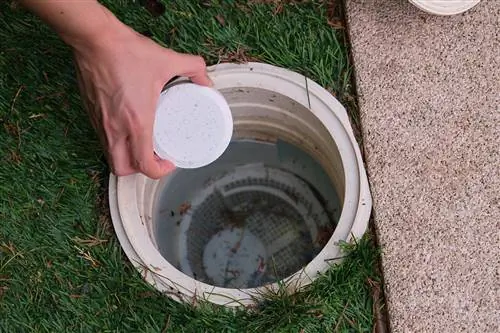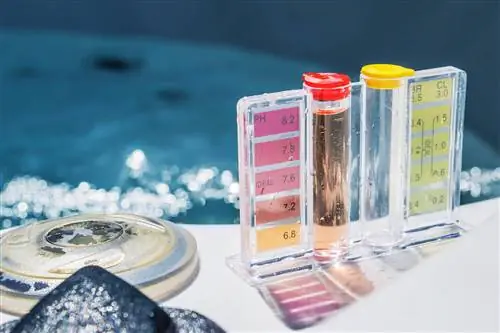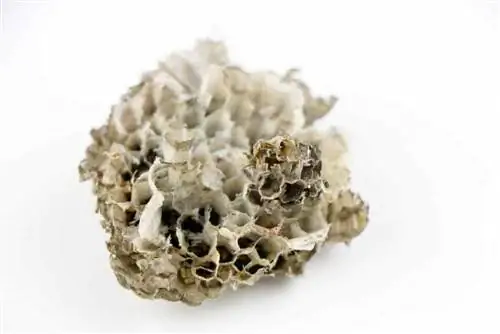- Author admin caroline@plants-knowledge.com.
- Public 2023-12-17 03:39.
- Last modified 2025-01-24 12:45.
How quickly chlorine breaks down in pool water is important information for various reasons. It is important to know which factors play a decisive role in the speed of degradation. This guide shows
which influences are crucial.
Type of chlorine
Products for chlorinating the pool can be found in various dosage forms. They differ not only in terms of preparation, but also in terms of speed. Quickly effective and therefore also in a short time
dismantled:
- liquid solutions
- Gas
- Granules
Even in the event of an overdose, the chlorine content drops significantly within 24 to 72 hours. With long-term remedies such as tablets, however, it can take up to eight days until normal values are reached again after too much chlorine has been administered. How quickly the chlorine breaks down depends on various factors. In addition, the salary can be reduced specifically and much more quickly.
Dosage and content
Mistakes in dosage can result in very high concentrations of chlorine in the pool water. Possible causes for this are:
- incorrect calculation of volume
- lack of testing before chlorine administration
- no coordination between funds
- Failure to concentrate
- neglected environmental factors
The volume is calculated using the formula length x width x height. The result is in cubic meters.
The following example illustrates the calculation
A pool measures 4 meters long, 3 meters wide and 1 meter high.
4 x 3 x 1=12 cubic meters
One cubic meter is equivalent to 1,000 liters of water. So this pool holds 12,000 liters of water. The amount of chlorine required for your own pool depends on the product in question. In some cases, a single tablet is enough for 30,000 liters, so in our example just one tablet would lead to a significant overdose. If there are also unfavorable environmental factors, the chlorine only breaks down very slowly.
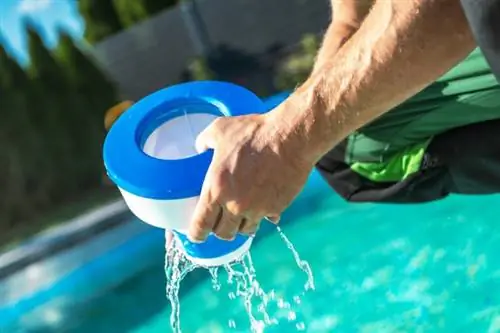
Tip:
Shock chlorination is a special case because large amounts of chlorine are intentionally added to the pool. However, the free chlorine reacts quickly and is broken down because shock chlorination results in greater contamination.
pH value
Chlorine can only act as a disinfectant if the water has the correct pH value. This is often not taken into account when maintaining the pool. If the value is in the optimal range between 7.0 and 7.4, the chlorine can react with contamination and is broken down in the process. Again, one to three days should be expected.
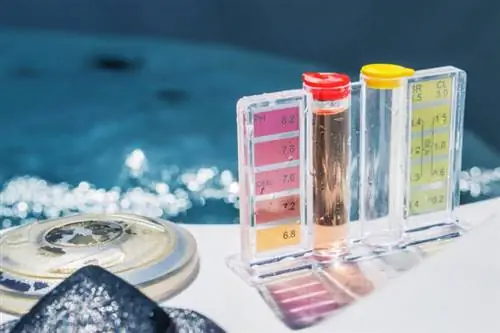
Environmental factors and care
Several factors play a decisive role in the speed at which chlorine breaks down. Lead to faster chlorine degradation:
- registered and flown-in contamination
- high intensity of use
- high temperature
- direct and long UV radiation
Is the water temperature at or below 18°C, is the pool covered and rarely used? Then the chlorine content can remain stable for a long time. In midsummer, however, with higher water and air temperatures, intensive use of the pool and strong sunlight, several factors come together that promote the breakdown of chlorine. On the one hand, more dirt gets into the pool. The free chlorine reacts with these and is broken down in the process. On the other hand, it evaporates more quickly due to the heat. Even higher doses are used up within 24 to 48 hours.
Tip:
In midsummer and when the pool is used extensively, you should aim for a slightly higher chlorine content of 1.0 milligrams per liter, as the value drops very quickly. At lower doses it can be too low after just 12 hours.
Frequently asked questions
Is there a rule of thumb for chlorine removal?
No, there is no such formula. The salary depends on several factors, which is why all influences must be taken into account. Even a slight deviation in pH or an increase in temperature has a significant impact on the rate at which chlorine is broken down.
How often do you need to add chlorine to the pool?
The frequency of chlorination depends on usage, temperature and contamination. As a rule, one to three doses per week are sufficient. If the water still appears cloudy or the chlorine content is not in the optimal range, the filter and water values should be checked.

